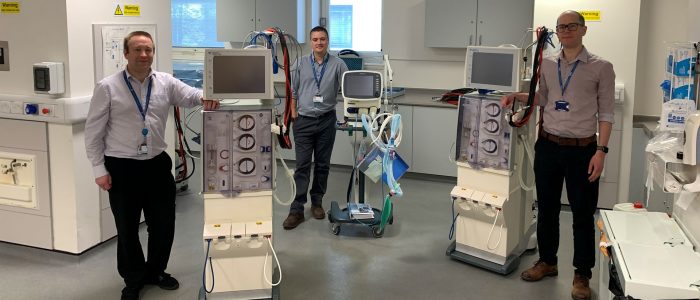Medical Equipment Adapted to Help Tackle Coronavirus
Adaptations to existing medical equipment at Forth Valley Royal Hospital have seen 35 anaesthetic machines converted to ventilators. This has increased the hospital’s capacity six-fold and an ultra-pure water supply system has also been installed in the Intensive Care Unit (ICU) to provide renal dialysis for patients with COVID-19.
The drive, which has been spearheaded by NHS Forth Valley’s medical physics department, involved medical physicists, technicians and clinicians working round the clock to complete the changes in record time.
According to NHS Forth Valley’s Head of Medical Physics, Bryan Hynd: “The amount of work and the complexity of what we have been doing in such a short space of time has been outstanding. This has been in addition to our normal workload and local staff have worked very long hours to put these innovations in place.”
NHS Forth Valley Director of Acute Services, Andrea Fyfe, said: “It’s been great to see the brilliant teamwork involved in these projects which have seen both our staff and the companies involved going above and beyond to make these changes which are benefitting patients in ICU. This is a perfect example of everyone pulling out all the stops to make things happen.”
The anaesthetic machines, normally used in operating theatres out with ICU, have been modified to use air instead of oxygen to power the ventilator. And the move to install a piped pure-water supply into the ICU was prompted by a worldwide supply issue with components used during haemofiltration, a renal blood replacement therapy which can also benefit patients with sepsis. Evidence suggests patients with COVID-19 appear more susceptible to increased blood clotting which has created the need for more frequent changes of machine parts.
To overcome potential shortages Bryan Hynd contacted Veolia, a company who already supply piped water to the renal unit and endoscopy department at Forth Valley Royal Hospital. A water treatment unit was quickly located. In normal circumstances this project would have taken around three months from the planning stages to becoming operational but due to the current pandemic the work was completed and water quality tests undertaken in just six days. It now means normal dialysis machines can be used in ICU, constantly serviced by piped water rather than the bags of fluid required for the haemofiltration process.
Bryan Hynd added: “We can only thank Veolia who supplied the water treatment plant free of charge, the specialist company Techsure who installed the high grade stainless steel pipe work, and the assistance provided by electricians and plumbers from our facilities company Serco who were fantastic. It’s amazing how many people wanted to help which reflects the spirit that we’re all in this together.”


